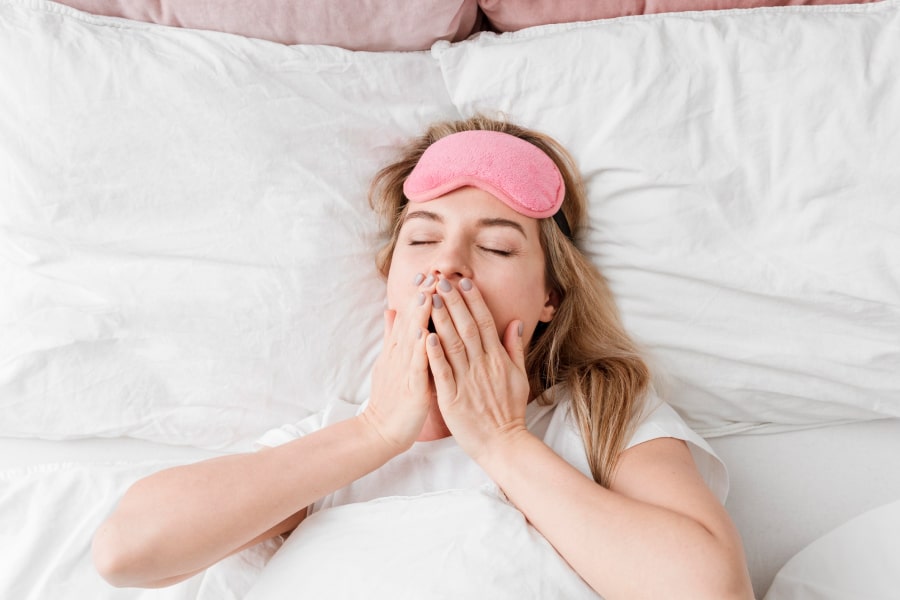A good night’s sleep is essential for our health, but did you know that your eating habits for sleep can play a major role in how well you rest?
It’s true! By focusing on eating habits for sleep, you can support your body’s natural rhythm, fall asleep easier, and even improve sleep quality.
Here, we explore four expert-approved eating habits for sleep that can make a difference. Whether you’re a night owl or an early bird, these tips will help you understand the relationship between nutrition and sleep to help you rest better and wake up refreshed.
The Relationship Between Nutrition and Sleep
The connection between food and sleep is complex but powerful. The nutrients you consume impact the hormones and neurotransmitters that regulate sleep, such as melatonin and serotonin.
That means eating habits for sleep can influence everything from how quickly you fall asleep to how deeply you rest. Let’s look at some foods and nutrients that can either improve or disrupt your sleep.
Foods That Help You Sleep
Certain foods are known for their sleep-promoting properties, making them excellent choices to include in eating habits for sleep:
- Tryptophan-rich foods: Tryptophan is an amino acid that helps produce serotonin, a precursor to melatonin. Foods like turkey, dairy, and nuts are rich in tryptophan.
- Magnesium-rich foods: Magnesium helps relax muscles and calm the nervous system. Spinach, almonds, and bananas are great sources.
- Melatonin-rich foods: Foods like cherries, tomatoes, and oats contain melatonin, which can help regulate sleep cycles.
- Complex carbohydrates: Whole grains like oats, quinoa, and brown rice can increase serotonin levels, making it easier to sleep.
These foods create a strong foundation for improving eating habits for sleep by supporting relaxation and regulating the body’s internal clock.
Foods That Can Hurt Sleep
On the other hand, some foods can make sleep elusive. Here’s what to watch out for:
- Caffeine: Caffeine blocks sleep-inducing chemicals, making it harder to fall asleep. Limit coffee, black tea, and soda, especially in the afternoon and evening.
- Spicy foods: Spicy foods can cause acid reflux and indigestion, particularly if eaten late.
- Sugary snacks: Sugar can cause energy spikes, making it difficult to wind down. Try to avoid high-sugar snacks close to bedtime.
- Heavy or fatty meals: High-fat meals can make your digestive system work overtime, disrupting sleep.
Being mindful of these foods can help you establish eating habits for sleep that promote quality rest.
How to Eat Better for Sleep
Ready to build better eating habits for sleep? Here’s what the experts recommend.
Have Tryptophan the Right Way
While tryptophan is known to promote sleep, it needs some help to reach your brain. Pair tryptophan-rich foods with carbohydrates to increase absorption. For example, eating a small portion of turkey with a slice of whole-grain toast can be a great pre-bedtime snack.
Avoid Foods that Cause Inflammation
Inflammation can interfere with sleep, so minimizing inflammatory foods can support better rest. Avoid processed foods, fried foods, and sugary drinks, which can trigger inflammation.
Instead, focus on anti-inflammatory choices like leafy greens, berries, and omega-3-rich fish like salmon.
Try Other Approaches with Sleep “Superfoods”
Besides tryptophan, other foods are often touted as “superfoods” for sleep. For instance, drinking a cup of chamomile tea can help calm your nerves, while kiwi is high in antioxidants and serotonin.
Including these in your eating habits for sleep can be a natural way to encourage restfulness.
Start Eating Early, Stop Eating Early
The timing of your meals matters. Ideally, you should eat your last meal at least three hours before bedtime.
This gives your body time to digest and helps prevent late-night heartburn or discomfort.
Similarly, eating breakfast soon after waking helps set a regular eating and sleeping pattern, reinforcing eating habits for sleep.
The “Liquid Loophole” and Gut Health
Try the Liquid Loophole
If you’re hungry before bed, try a calming beverage instead of a heavy snack.
A warm glass of milk, chamomile tea, or even a simple glass of water can be soothing without adding the calories or digestion effort that a meal would.
It’s a gentle way to satisfy the stomach without disrupting eating habits for sleep.
Feed Your Gut Bugs
Did you know that gut health affects sleep? A balanced gut microbiome supports neurotransmitters that regulate sleep.
Try adding foods like yogurt, kefir, or fiber-rich vegetables to your daily routine. Feeding your “good” gut bacteria is an easy way to support both digestive health and eating habits for sleep.
Be Consistent with Eating and Sleeping
Consistency is key to good sleep. Just as going to bed at the same time helps establish a routine, eating at regular times keeps your body’s internal clock stable.
A predictable eating schedule is one of the best eating habits for sleep, helping your body know when it’s time to rest.
Have a Vegetable Before Breakfast
This might sound unusual, but eating a vegetable before breakfast could benefit your sleep.
Vegetables contain fiber and antioxidants, which support digestion and regulate blood sugar levels.
By balancing your blood sugar first thing in the morning, you’re setting up eating habits for sleep that benefit you all day long.
Foods, Diets, or Eating Habits That Improve Sleep
Various dietary patterns are associated with better sleep, including the Mediterranean diet, which emphasizes fruits, vegetables, whole grains, and healthy fats.
This diet provides essential nutrients that regulate sleep and reduce inflammation. Eating habits for sleep aligned with Mediterranean principles can be a great long-term strategy for restful nights.
Nutrients That Affect Sleep Quality
Some nutrients have a direct impact on sleep:
- Carbohydrates: Complex carbs can boost serotonin levels, promoting relaxation.
- Protein: Protein provides amino acids like tryptophan, essential for melatonin production.
- B vitamins: These vitamins help regulate melatonin and serotonin, aiding sleep.
Adding these nutrients to your eating habits for sleep can significantly improve the quality of your rest.
Are There Any Drinks and Foods to Avoid?
Yes! Here are some additional drinks and foods to avoid for better sleep:
- Alcohol: While it may make you sleepy, alcohol actually disrupts your sleep cycle.
- Chocolate: Chocolate contains both caffeine and sugar, which can keep you awake.
- Processed snacks: Chips and candy may be convenient, but they often contain additives that can interrupt your sleep.
Following these guidelines will help establish eating habits for sleep that encourage quality rest.
Conclusion
Improving your eating habits for sleep is one of the easiest ways to enhance your sleep quality naturally.
By focusing on nutrient-rich foods, timing your meals, and avoiding certain foods, you’re setting the stage for better rest and health overall.
Start small, and enjoy the journey toward better sleep!
FAQs
What foods are good for sleep quality?
Foods rich in tryptophan, magnesium, and melatonin, such as dairy, leafy greens, and cherries, can help improve sleep quality.
Does a Mediterranean diet help sleep?
Yes, the Mediterranean diet includes sleep-promoting foods like whole grains, leafy greens, and healthy fats, making it great for eating habits for sleep.
Do eating habits affect sleep?
Absolutely! When and what you eat directly impacts sleep quality, making it essential to establish eating habits for sleep that support restful nights.
What is the best eating schedule for sleep?
Eat balanced meals throughout the day and avoid heavy meals close to bedtime. Aim for your last meal at least three hours before sleeping to help digestion.







